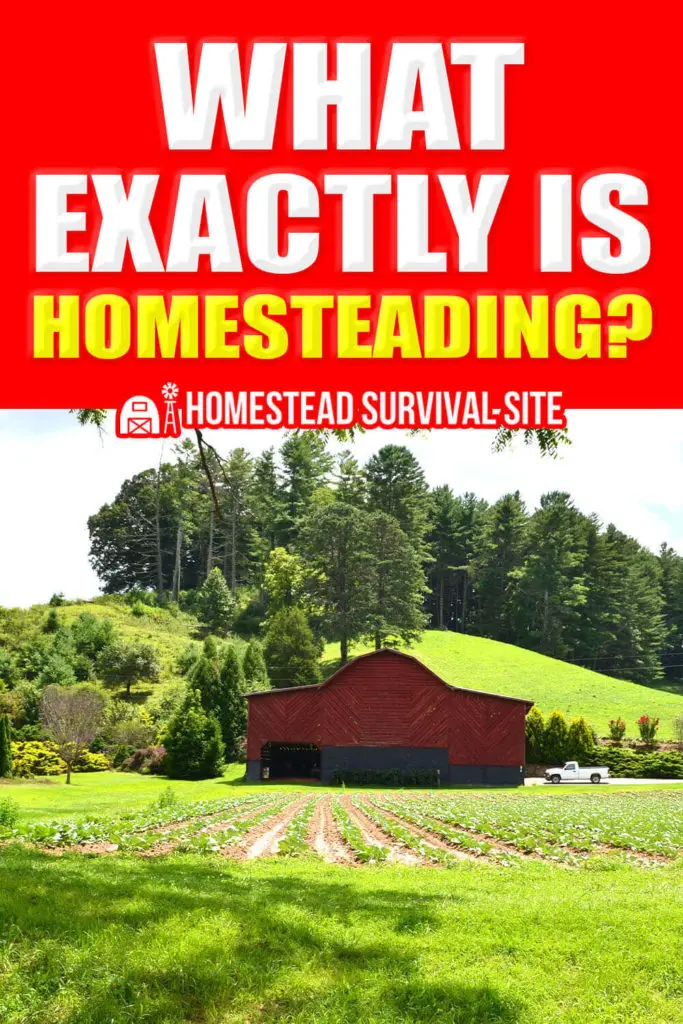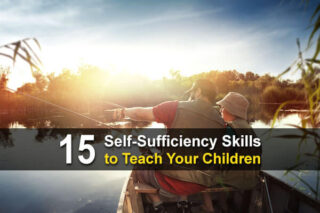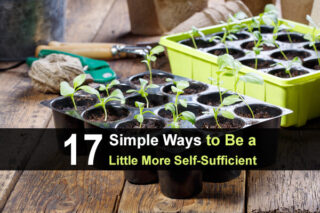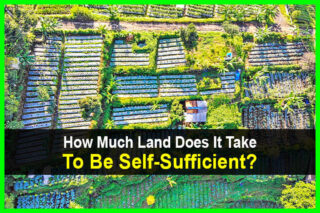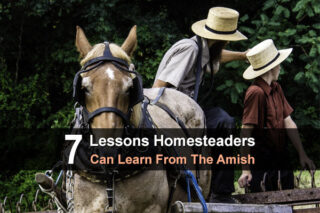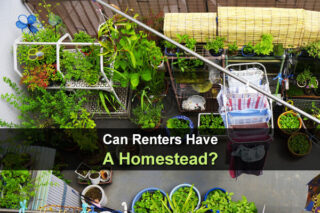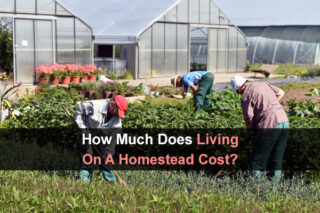Estimated reading time: 10 minutes
Welcome to Homestead Survival Site! This is the very first post of my new website, so I thought I’d use it to explain the concept of homesteading, the kind of articles to expect, and the overall purpose of this site.
What is Homesteading?
It depends on who you ask. For most people, a homestead is a place where a family or group of people live together and attempt to be as self-sufficient as possible. That doesn’t mean they’re completely self-sufficient (few homesteaders are), but they try to minimize their dependency on the rest of society.
To do that, homesteaders do things like generate their own power, collect their own water, grow their own food, raise their own livestock, make their own stuff, cook their meals from scratch, and so forth.
They try to use their space and resources efficiently, and they regularly reuse and upcycle things that most people would throw away. As you can see, homesteading is not a hobby that you do for a few hours on the weekend; it’s a way of life.
Want to save this post for later? Click Here to Pin It On Pinterest!
The dream of most homesteaders is to be so self-reliant that they can live off the grid completely and only go to the store on rare occasions. However, many homesteaders are content to stay where they are (some even live in apartments) and simply minimize their carbon footprint—not necessarily because they’re afraid of climate change, but because they respect mother Earth, don’t want to be wasteful, and believe it’s wise to learn basic pioneer skills.
For a long time, the term “homestead” referred to a free government land program. After the Civil War, the Homestead Act declared that anyone who had never borne arms against the U.S. government could claim 160 acres of land for free if they lived on it continuously for five years. The pioneers who lived on those plots of land are widely regarded as the first “homesteaders.”
By the mid-twentieth century, the days of pioneers had long passed and most of the land had been sold to mega-farms and ranches or reclaimed by the government. However, in the 1970’s there began a movement of people who were tired of urban centers and the consumer culture, and who wanted to return to their pioneer roots. That was the beginning of the modern homesteading movement.
Now to be clear: The goal of homesteading is not to replicate pioneer living (we’ll leave that to the Amish). Rather, the goal is as self-reliant as possible by whatever means necessary. So if there is a modern technology that helps with that goal, most homesteaders are more than happy to use it. For example, they regularly use solar panels, wind generators, power tools, kitchen appliances, water filters, and many other tools that are also commonly used by preppers.
There is a great deal of overlap between homesteaders and preppers. In fact, all homesteaders are preppers but not all preppers are homesteaders. If you’re a homesteader, then although it’s not necessarily your goal to prepare for a disaster, you’re going to be ready for one anyway. Preppers, on the other hand, are mainly focused on stockpiling supplies for a temporary disaster and aren’t necessarily prepared to do things like grow their own food and make their own things.
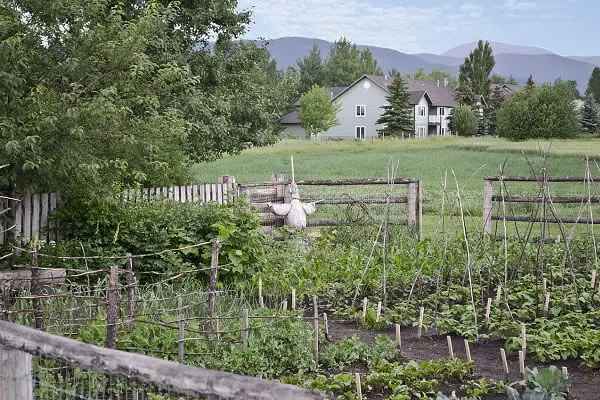
What To Expect From This Site
Now that I’ve explained what homesteading is, I want to explain the kind of articles you can expect to see on this site. Although I plan on sharing the things I’ve learned on my own journey as a homesteader, I’m mostly going to publish articles by other homesteaders who have just as much or more experience than I do.
Everyone who lives this lifestyle has their own strengths. Some of us are better at gardening, some of us are better at raising animals, some of us are better at DIY projects, and so forth. I’m going to reach out to dozens of writers and get the best advice from the best homesteaders I can find. And as chief editor, I am going to make sure that every article is clear and easy to understand for both experts and novices.
In addition to seeking out writers, I am also going to find and curate the best articles and videos on homesteading that I can find. My hope is that within a couple of years, you’ll be able to find everything you ever wanted to know about homesteading on this website.
Along the way, I’m going to organize the articles into the following categories:
• Animals – Beekeeping, backyard chickens, fish farming, raising livestock, butchering animals, homestead pets, how to deal with wild animals, and so forth.
• Cooking and Baking – How to make your own alcohol, bread, condiments, dairy products, etc. Delicious and easy recipes for homesteaders, and tutorials on off-grid cooking methods such as Dutch ovens and wood stoves.
• Energy – Wind power, solar power, hydropower, generators, and other ways to generate electricity. How to start and build a good fire, and information on batteries and lights of all kinds.
• Food Storage – Information on canning, dehydrating, freezing, fermenting, smoking, and other food storage methods. Lots of food storage recipes, and tips on how to properly organize and store your food.
• Frugality – Advice on how to find great deals, lower your utility bills, and make extra money. Lists of alternative uses for everyday items; how to reduce, reuse, and recycle; and step-by-step upcycling projects.
• Gardening / Farming – This will probably be the largest category. It will include information on aquaponics, composting, container gardening, raised bed gardening, how to grow various types of beans, herbs, fruits, trees, flowers, and vegetables, and general gardening tips and projects.
• Health and Wellness – How to clean your home and wash your clothes off the grid, recommended first aid supplies and how to use them, basic first aid skills, and lists of home remedies using things like medicinal herbs and ordinary foods.
• Make Your Own – Tutorials on how to make your own clothes, cleaning supplies, health and beauty products, and all kinds of DIY projects with steps and pictures.
• Miscellaneous – All the topics that don’t fit elsewhere: blacksmithing, masonry, off-grid communications, general homesteading tips, advice for beginners, ideas for parents, and lists of supplies.
• Structures – How to build fences, gates, stables, pens, sheds, root cellars, smokehouses, and other structures commonly found on homesteads.
• Tools and Weapons – Articles and reviews of firearms, knives, and all kinds of homesteading tools.
• Water – Information on how to properly collect, purify, and store water so that it’s safe to drink for years to come.
• Weather – How to stay warm when it’s cold outside, how to stay cool when it’s hot outside, and how to prepare for and survive weather disasters such as blizzards, hurricanes, and tornadoes.
Obviously it will take some time before I have articles on all these topics, but I plan on updating this site five days a week with two new articles, two curated articles, and one new video. In a few years, this blog will be the ultimate site for homesteading information.
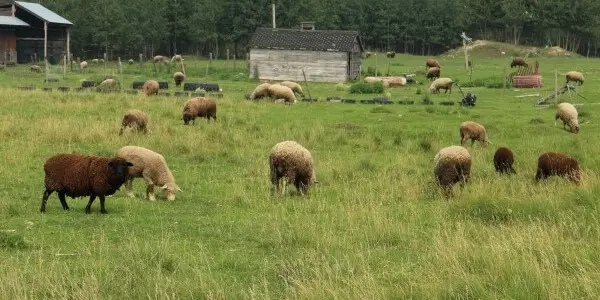
The Purpose of This Site
You might be wondering why I’m doing this. I’m an honest person, so I’ll tell you: Part of my motivation is to make some extra money. My family and I are working toward getting out of debt, acquiring more land and supplies, and living a more sustainable lifestyle, but we have a long way to go.
However, if money were my only motivation, I would start a blog on diet scams or celebrity gossip or conspiracy theories. All of those would be more profitable, but those types of sites are part of the problem with the Internet nowadays. My main motivation is to try and balance all the false and useless information out there with more positive and helpful information.
When the Internet first came along, I believed it would spark a new Renaissance. Everyone would have immediate access to the collective knowledge of all mankind. People would be more educated, which meant they would be wiser, which meant the world would become a much better place.
Sadly, it seems I overestimated mankind because so far, the Internet is having the opposite effect. Instead of educating themselves, people are wasting their time by playing games, looking at pictures, reading fake news stories, and obsessing over trivialities.
Don’t get me wrong, there’s nothing wrong with a little entertainment, but it’s gotten to where entertainment is 99% of the Internet. Webmasters publish what they think will get the most clicks, not what they think will educate people. It is my hope that this site will entertain people while educating them at the same time.
The world needs more people who know how to live healthfully, avoid artificial chemicals, and stay in touch with nature. People who understand the concept of sustainability, who contribute to society rather than take, who can take care of themselves should the worst happen, and who will pass traditional skills on to the next generation. If this website helps create a few more people like that, I’ll consider it a success.
Recommended Books
As I said, it will take some time before this site has articles on all the various homesteading topics. So in the meantime, I want to recommend some excellent books that taught me much of what I know.
Back to Basics: A Complete Guide to Traditional Skills – This is the ultimate coffee table book for preppers and homesteaders. Although it’s available for the Kindle, I highly recommend the hard cover version. It has over 450 large pages with full-color photos, charts, diagrams, and step-by-step guides, and it covers all sorts of pioneer living skills such as: converting trees into lumber, building a log cabin, harnessing wind and water power, growing a productive gardening, raising and butchering animals, preserving all kinds of food, weaving your own clothes, making your own soap, and much more.
Encyclopedia of Country Living: The Original Manual of Living Off the Land & Doing It Yourself – Unlike Back to Basics, this book does not have the full-color photos and diagrams. However, it is far more thorough. At over one million words, this book teaches almost everything there is to know about living a completely self-sufficient lifestyle. If the world ever comes to an end and people have to rebuild society from scratch, this is the book they will need to get them started.
The Homesteading Handbook: A Back to Basics Guide to Growing Your Own Food, Canning, Keeping Chickens, Generating Your Own Energy, Crafting, Herbal Medicine, and More – If Back To Basics and The Encyclopedia Of Country Living are too intimidating for you, then I recommend starting with this book. Although it includes everything you need to know to start a successful homestead, it’s more of an introduction than the other books. Whereas the other books make great references, this is one you can sit and read from beginning to end.
The Urban Homestead: Your Guide to Self-Sufficient Living in the Heart of the City – This book is geared toward people who don’t necessarily want to move to the country and live completely off the grid. Rather, it’s for families who want to stay where they are and use the space they have to grow their own food, raise their own animals, make their own things, and generally be more self-reliant than the average family. Going this route will save you a lot of money and ensure that you’re prepared in the event of a disaster.
Like this post? Don't Forget to Pin It On Pinterest!
You May Also Like:



